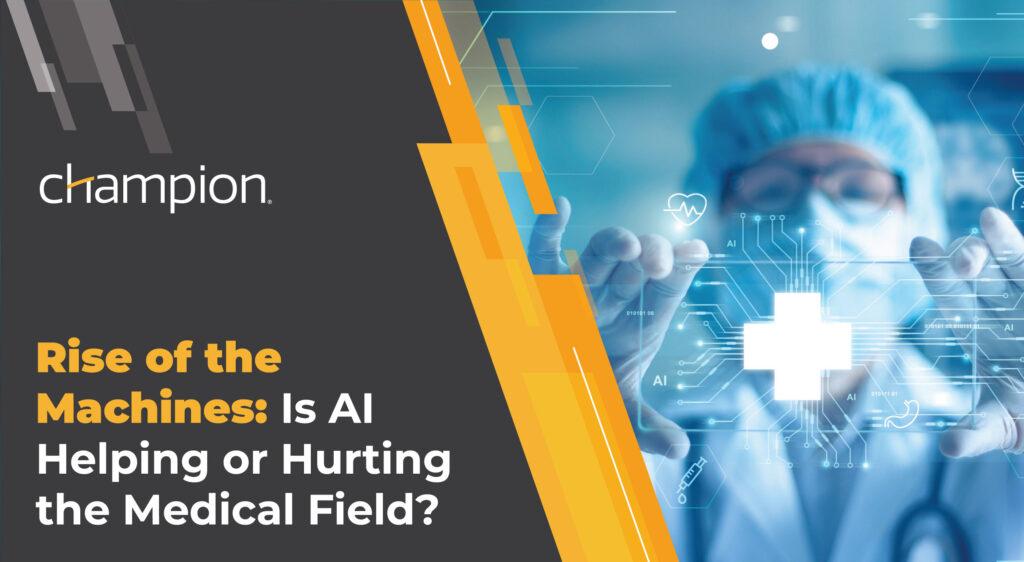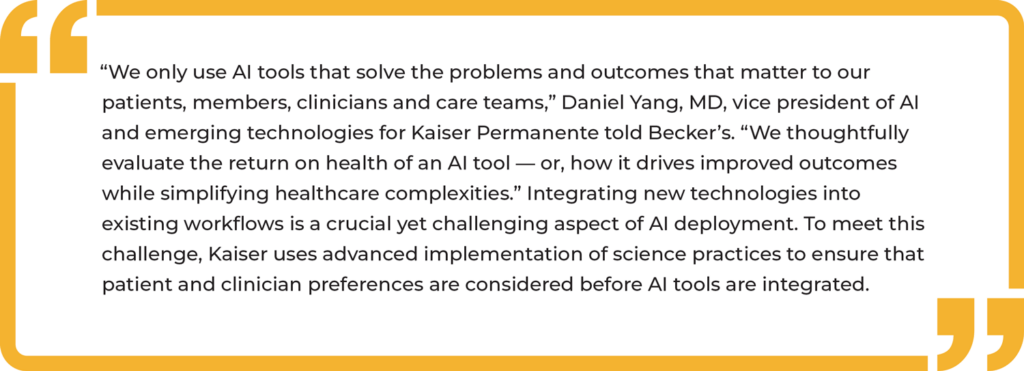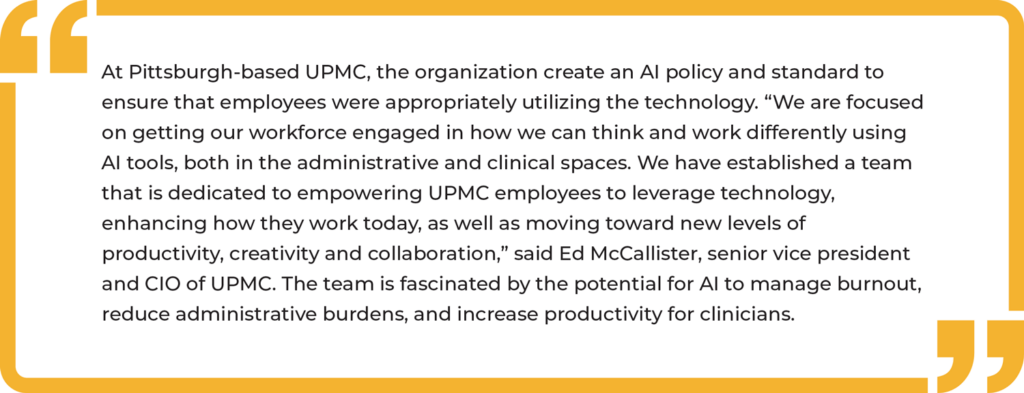
Rise of the Machines: Is AI Helping or Hurting the Medical Field?
Artificial Intelligence (AI) offers to improve efficiencies, streamline workflows, and speed up processes far beyond the rate of human capability. But when it comes to healthcare, there are dangers in letting AI have too much sway.
Yes, computers can help improve patient outcomes and certainly alleviate administrative burden, but when the stakes are as high as life and death, many practitioners worry about losing the doctor-patient relationship even more than they worry about their role being replaced by a machine.
It’s not watching too many Terminator movies that has physicians and nurses concerned. Robotics are already utilized in numerous types of surgeries, yet the skilled surgical team is still present and required to operate the machine. This can lead to more precise operations and fewer mistakes, and that’s good news.
But flip the coin, and you have data breaches where nefarious organizations hold entire health systems “hostage” by capturing their private reams of patient information and holding it ransom. In these instances, entire facilities have shut down, trying to rely on handwritten notes and old-school methods while patients can’t receive timely lab reports or go ahead with scheduled surgeries because the medical staff doesn’t have access to the information it needs to proceed. That’s the bad news: Everyone has to wait while law enforcement investigates the matter and recovers access to the “protected” data vault.

Will AI Replace Humans in the Workforce?
When it comes to math, processing, and speed, computers are the clear winners. Think Olympic gold medalist sprinter vs. running around during kindergarten recess. In speed of calculation, modern processors can perform billions of calculations per second. For example, a CPU with a clock speed of 3.0 GHz can execute 3 billion cycles per second. The human brain operates much slower in terms of raw calculations, taking several seconds to perform simple arithmetic operations without the aid of tools. Computers can access and retrieve data from “memory” in nanoseconds. For humans, retrieving pieces of information can take several seconds or longer, depending on the complexity and familiarity of the data.
Sign up to get the latest industry news and offers right in your inbox
For many tasks, and even job positions, AI has the advantage — whether it’s replacing humans in current roles or taking the lead in the creation of new roles. The World Economic Forum’s Future of Jobs Report illuminates the duality of AI’s impact: It estimates that by 2025, 85 million jobs may be displaced by automation while 97 million new roles are projected to emerge, reflecting a shift in the division of labor between humans, machines, and algorithms. However, these new roles are predominantly for areas such as machine learning engineers, data scientists, and AI researchers.
This sort of overhaul is not new. During the Industrial Revolution, which spanned from the late 18th to the early 19th century, labor markets were significantly transformed. The introduction of machinery caused substantial job displacement, especially in the agricultural sector and textile industry, as the need for manual labor was drastically reduced. Again, the people who learned how to make, repair, and operate the machines were the ones who avoided redundancy layoffs.

What Jobs Are Resilient to Automation?
Conversely, certain jobs are less likely to be replaced by machines — and this is good news and bad news for the healthcare sector. Advanced technical positions that involve complex problem-solving, critical thinking, and specialized knowledge (such as doctors, scientists, and med-tech professionals) are more resilient.
Roles involving repetitive cognitive tasks (like data entry, bookkeeping, and basic customer service) are at risk as AI systems become more capable. This means the front office staff may be impacted more than the medical staff. As always, jobs that require empathy, human interaction, and personal care (such as nurses, therapists, and caregivers) are less susceptible to automation. Thankfully, this is good news for employees and patients.

How Is AI Impacting the Medical Field?
AI is transforming the healthcare industry in profoundly positive ways; however, the adoption of AI also presents challenges that must be carefully managed. To read a critical evaluation on both sides of the same coin, the National Center for Biotechnology Information offers a scientific article that examines the Impact of AI Tech in the Healthcare Sector, pointing out that “AI is used daily from the online scheduling service for appointments to drug interaction warnings when physicians prescribe multiple medications to research development” while also illuminating the disadvantages of defaulting to AI that decision-makers must consider.
Some of the pros and cons of AI in healthcare include:
AI can save time and money in the healthcare industry by streamlining tasks that do not require human kindness, allowing healthcare professionals to focus on more complex and patient-centered activities. Administrative duties such as scheduling appointments, processing insurance claims, and maintaining medical records can be efficiently managed by AI systems, reducing the burden on staff and minimizing errors.
Additionally, AI can handle repetitive diagnostic tasks, such as analyzing medical images and laboratory results, with greater speed and accuracy than humans. This not only accelerates the diagnostic process but also decreases the need for extensive human resources in these areas, leading to significant cost savings.
Automated systems can also manage inventory and supply chain logistics, ensuring that medical facilities are well-stocked with necessary supplies without the need for constant human oversight. By automating these routine functions, AI creates efficiencies that free up healthcare workers to dedicate more time to patient care.
However, there are areas in healthcare where human critical thinking and empathy are irreplaceable. Complex diagnostic situations often require nuanced judgment and the ability to integrate diverse pieces of information in ways that current AI systems cannot match. Human doctors can draw from a broad spectrum of experiences and contextual knowledge to make decisions that consider the unique circumstances of each patient.
Furthermore, the emotional support and compassionate care provided by healthcare professionals are essential components of the healing process. Patients often need reassurance, empathy, and a personal connection that AI cannot provide.
Building trust, understanding patient concerns, and offering emotional comfort during difficult times are aspects of care that machines, regardless of their advancements, cannot replicate. The human touch in medicine is crucial for fostering patient well-being and ensuring holistic care, highlighting the indispensable role of healthcare professionals in the industry.

Champion Chairs Aren’t Human, but They Care About Patient Comfort
Every healthcare facility in the country has some kind of medical seating for its patients. Yet not all medical seating is the same. Due to advances in scientific research on the connection between patient-centered seating and increased positive outcomes, modern design still focuses on functionality, cleanability, and durability — but you can now add versatility to that list.
Versatility (ergonomic seating with flexible configurations for multiple uses plus adaptable positioning for a range of medical procedures) makes a big difference in how providers, caregivers, and patients experience healthcare.
And Champion’s Alō Collection of medical recliners is leading the way, especially in oncology settings.
To view our entire portfolio of products, browse our digital catalog. Then, request a quote for your facility.
